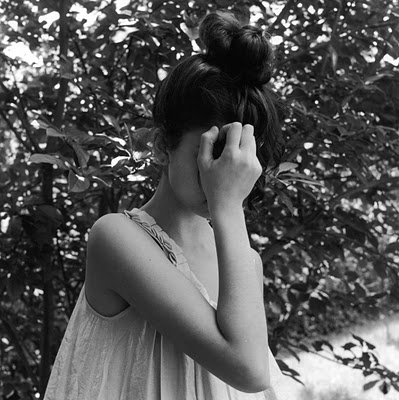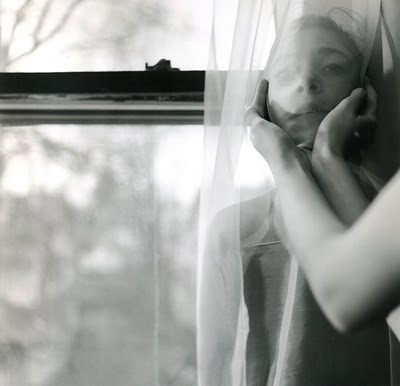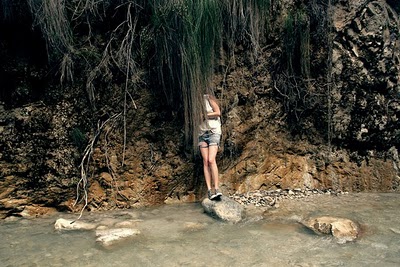
Toni Packer: Our Beautiful Mind
From The Silent Question by Toni Packer (2007)
Toni: …When he was asked what it was like to come out of the siege of madness, John Nash replied that it was like waking up from a heavy nightmare. What was captured in the movie (A Beautiful Mind) and the interviews reminded me of two very close women friends who were stricken with similar paranoid schizophrenia years ago. One took her life, and the other one submitted to many courses of shock therapy.
The heartrending essence captured in this movie was that no matter how obscure, absurd and seemingly insoluble the overlay of illusions and hallucinations may be, there remains the possibility for a transformation happening in the brain – the possibility of waking up to a presence that is whole and undisturbed. In the movie it happened when Alicia, kneeling in front of John’s bed, gently touches his cheek and whispers, “Is this real?”
Isn’t this the essence of the work of this moment, discerning the difference between what is real and what is fantasy? There was beauty in showing that Nash no longer tried to “get rid of” hallucinations, hearing voices, and so on – allowing such symptoms to come and go on their own. He would simply say something like this: “I see some people over there looking at us and I hear voices in my head, but they’re not real and need not be given any attention. I don’t have to do that anymore.” His brain grew increasingly capable of ignoring perceptions of what was not real. In this development his wife, friends, and colleagues played an important part as a loving presence, continuing to ask, when needed, “Is this real or is it just imagination?” It is exceedingly helpful and important for all of us to ask questions like this once there has been an initial waking up from our lifelong dream-stories…
Nash suffered, screamed with frustration, because his was such a powerful, problem-solving mind, saying, “I can solve this, I’ll be able to solve this.” But then came the realization that this was not solvable by thinking, but by thinking giving up trying. Thinking falling silent. When that happens, love reveals itself on its own.
…People ask, “When the compulsion to figure things out through thinking drops away, can it drop away for good? Can this ‘me,’ this illusory network stop forever? No! But you can see it for what it is. You see that it’s not real, provided that at this moment there’s the openness of seeing. There may be times when you don’t want to see the futility of “me” engagement – thinking about being praised and flattered – because it is very pleasurable! When the “me”-image gets hurt, well, then there is a motive for dropping it.
…This is the beautiful thing that happened to John Nash. There was this possibility of seeing the unreality of something, in spite of heavy hallucinations… and in spite of a brain that was working constantly, in his case working on pattern recognitions. He couldn’t watch a bunch of pigeons pecking at crumbs without jotting down in what pattern they were eating. It was the obsession of this brain to figure out patterns and to put everything into formulas. And yet that brain healed to the point where he could teach properly again. He did good work. Wonderful. I think it’s marvelous. (Pause) And if it doesn’t happen to me or you, then it doesn’t; and you may end up taking your life because you don’t want this one, but life goes on nonetheless. I’m not saying that callously, it’s a fact.
Participant 3: This reminds me of the night before I came here, when I had dinner with a young man I’ve known and worked with for quite a while, who regularly had episodes of distress, threatening to kill himself, and had already been to see every therapist and psychiatrist in the book. He also has a frantic mother, who is on just as many medications as he is and who also has just as many therapists and psychiatrists. I’ve know these folks for seven or eight years now. I had taken him out to dinner because he’d dared to go to school again that day; it was a big celebration. I drove three hours to have dinner with him. He was sitting across from me and he was telling me absolutely fabulous lies – about what he was capable of doing and being. And yet every once in a while he’d take a bite of something delicious, really tasting it, and he’d say, “This really tastes good!” Or he’d make some kind of glancing comment about something that was really happening, and he’d look at me with his whole face open. I realized that the only thing that really was true, that was important there, was that we were eating together and that we were talking and that I could listen to him, and it didn’t matter whether what he told me was true or false. He was this being that was there. And I could see him whole, even though he had this crazed, wild energy. You could see it in his face, all the clarity that was in there somewhere. So now you’re talking about this cloud that can come over us, how we can suffer over so much of what happens with people we love… yet there is also this very simple thing. Whenever I get a chance, I just invite him to my house. He lies on the sofa, and the dog lies on his chest, and that’s all there is.
Toni: And, you know, to finish the story of the woman who did take her life, she came to say good-bye to me, though she didn’t tell she was going to take her life. Seeing her as I sat on the upper floor and she came up the stairs, I was surprised at how light she looked. Beautiful. And we had a wonderful conversation. Much more intimate than usual, for she was usually evasive and talked about how hopeless everything was. Then, as she went down the stairs, she turned and looked back up with a wordless “good-bye,” and it was simple presence. Downstairs she chatted with the receptionist, which she normally didn’t since she disliked meeting and interacting with people. This time she had already decided to put an end to it. So I never could grieve for her in the way you do when somebody is run over by a car.
Participant 1: That shows, among other things, that the decision was taking control. It is often like that. And also, when people start taking medication or start having more energy, then that’s a place of danger when it comes to suicide, because then they have the energy to make that decision.
Toni: But this woman never took medication…
Participant 1: Yes, it can happen on its own. It’s that upswing of energy that leads to being able to take some control, but not enough control to be with the pain.
Participant 4: The story you were telling triggered a memory of my mother. She died of a brain tumour. There was a point at which she understood that she was going to die and she decided not to take any more treatment. She had always been pretty tense and tried so hard to be good, to be careful about how she ate, and so on. I remember the relief on her face when she realized she was going to die. She had a box of chocolates sitting there and she said, “I can eat these and really enjoy them!” Those last few months were quite remarkable, because something freed up in her: the pressure of having to keep herself together to meet all those needs to be loved and be a good person. They softened for her, and so much more of her honest nature was released. It was really quite a poignant and amazing thing.
Participant 1: I was just thinking how wonderful it would be to have those things release without death having to be imminent. I think that’s part of why we’re looking so hard at this “me”-structure, at the constraints it puts on.
Participant 5: My father had severe dementia and came to live with me. Over a period of four years this overlay of “me” just deteriorated, and what showed up was radiant. He was so present that many people didn’t know there was anything wrong with him. He was so perceptive, including being perceptive about what was going on with other people. I would have conversations with him where I couldn’t understand a thing he was talking about. It taught me to just be there, be present, but not try to use the mind to connect. I sometimes felt like I was in a transported state myself, because there was no way to stay intelligent with it in the usual way. After a conversation like this he would sometimes say, “That’s it. That’s conversation. The best conversation we’ve had!” He would call a bird “a fish” and… everything about it was topsy-turvy. It was so delightful to be with him. And when people would meet him, they’d see this radiant face.
After he passed away, many people said they’d never felt such love as they’d felt when meeting and greeting my father. Earlier in his life, when this overlay was there, he was judgmental, very prejudiced, hated some of my friends. I remember one friend who had dreadlocks. How my father hated him! But with the overlay gone, he greeted him with enthusiasm and delight, “Hey. My best friend is here!” So much was wonderful for him in the last years of his life. He enjoyed so much. Everything he ate was delicious; it didn’t matter what it was. It was a powerful thing. It taught me so much about not needing to have so much mental construct to be very happy, present, free. So free. He had relatively good physical health, so he could do things. At his memorial service, when people spoke about their relationship with him – my brothers were there and also others who hadn’t been willing to be around him during those last years – they were completely befuddled by what people who had been around him were saying about him.
Participant 2: I heard many stories, especially when I was in India, of people becoming enlightened shortly before they died and I thought… well… the same as these stories some of you are telling point out to me: why wait? Whatever enlightenment is, I’m not saying I know what it is. But just to be with these people, what a gift.
Participant 6: Why do we wait? Why can’t we just…? There must be a way. Why do we wait?
Toni: When you notice that you’re waiting, ask immediately, “Why wait?”
Participant 6: Krishnamurti said that you can step out of the overlay, out of the circle of blindness.
Toni: You’re not even in it.
Participant 6: But I seem to need someone else to show me that.
Toni: Years ago we had a man on staff here whose father had Alzheimer’s. He would regularly go on visits to his father, and I would always get the report. These were often miserable visits because the father was so resentful about his sickness. He knew he had Alzheimer’s and would ask, “Why me?” and on and on. And then one day this man came back from a visit and reported that his father no longer knew he had Alzheimer’s. He said his father was free from burdens, relieved of that knowledge that there was anything wrong with him. So I wonder, maybe people do not suffer as much as we project that they do, or maybe there is that kind of suffering but only in the initial stages, when they still want to function properly but realize they can’t anymore. Eventually that passes as the part of the brain that keeps track of everything begins to deteriorate. What is there to keep track of except being here? The people here who have talked about their friends or relatives with Alzheimer’s confirm that.
So can there be a shedding of this keeping track and judging ourselves now, while we’re not sick? Of course, there are physical aspects to Alzheimer’s too, aren’t there? So it’s not just a matter of mental deterioration.
(turning to Participant 5) Did your father have physical symptoms as well?
Participant 5: No, not really. He was 93 when he died and was still quite robust. He knew that something was wrong with him, but he felt safe. So he didn’t worry about it. Once he felt safe, he was OK with it. I sense that others with Alzheimer’s who have maybe gone to institutions or have been in situations where other people try to control them more…. they haven’t done as well. I remember someone telling me that it didn’t matter if my father put his shirt on over his pajama top, just worry about the big things. So once there was no longer any resistance there, he just enjoyed whatever was going on. He was like a child in that way. If he poured coffee on his cereal and if I didn’t make a thing out of it then it was no problem for him. But if I made something out of it, he would be humiliated and then angry. I think he had a sense that he had a very safe place to be whatever he was. So there was no resistance. He talked to me sometimes about things he knew were wrong with him. He didn’t know who I was, actually…
Toni: … and what does that matter? People make something out of that. But as long as there is a relationship.
Participant 5: …exactly. If I just related, we were fine. But if I insisted on who I was, if the daughter in me came up and I insisted he relate to me as his daughter, it was very difficult for him. For both of us. But when I didn’t care what he called me, and we were just two beings together there, then I was able to look after him and he knew and appreciated that.
Toni: In that way you had great value during this time he was going through.
Participant 5: Also, I could tell the type of love he felt wasn’t conditional on being father and daughter. I don’t know how to describe it. It was open, not role based. He was very happy to relate to me, perhaps the way a small child would be. Not thinking the thought that, “This person is taking care of me,” but instead just being happy to be with someone who is caring.
Participant 4: The sense of safety that your father felt where he poured coffee on his cereal but wasn’t reprimanded for it… I’m thinking now about how painful it would have been for him to be in a situation where nothing he did fit the way he was supposed to be. Yet isn’t that just how we all live? We have such a hard set of things that we’re supposed to be doing… I suspect we don’t know the half of it. And we do it to ourselves, mainly, and we do it to each other. So we don’t feel safe. So all of those innocent ways that we are, that might come out wrong; we’re so afraid and so careful. In my own world I think that’s a very great sense of pressure, that lack of safety. And yet, when that’s not taken too seriously, when those expectations are seen but somehow there’s a softness around them, a good-heartedness, this is not such a big deal. Then a naturalness arises that’s so much fun.
Participant 1: This reminds of a discussion at an earlier retreat where (Participant 5), you brought up getting notes about smiling, from someone taking a kind of supervisory attitude. (laughter) I related to that, and was able to soften around it. I mean, I could see how I lay that kind of trip on myself, how we lay it on ourselves. For example, worrying about whether my clothes are too bright or am I walking too quickly… or whether my table manners are perfect. Seeing that this might just be a phase is helpful.
Participant 7: But (Participant 4), you touched on something… this sort of persecutory inclination where we torment ourselves…
Participant 4: It’s like… those rules are all there, those expectations… and following them, well, somehow it seems to be about getting love, that we’ll be accepted, included, not judged. It’s such an irony that you spent your life living in this rigid world of judgment, which is a world of rejection and separation, in order to be loved. It’s a strange twist, isn’t it?
Toni: (Participant 8) said this morning that we suffer from isolation, and isolate ourselves with this kind of behaviour, with the judging, persecutory thoughts that the brain manufactures. So what can you do? See it, see it, see it. And stay in the seeing rather than the isolating stuff. That all comes and goes, but the seeing doesn’t come and go in the same way. Can that seeing take the place of these absurd circuits?
Participant 8: In seeing them, they show how absurd they are.
Participant 4: And not adding to these circuits that we have to get rid of these judgments. That’s just a new version of the same old story.
Toni: To see that without doing anything about it. Just listening to the fan – not intentionally but because it’s there. That’s really what it all amounts to – the replacement of those hyperactive, worrisome, wanting modes with quietness and presence, the one taking the place of the other. And not once and for all, but all the time. Freshly.
Participant 4: Could you speak about that replacement? I’m not sure I understand what you mean by that.
Toni: You had a very good example. You notice the inner movement of wanting to be loved, and that’s the reason you try to stick to the rules. Or, if you think you’ve transgressed, you feel guilty, constantly worrying whether you’d done something wrong. If the pattern is seen, then the pattern is replaced with the seeing. Not doing something about it, because that would be creating another pattern. Just the openness of presence – wind blowing, quietly breathing in and out, in and out – simple, total presence. A constantly fresh replacement of the patterns with pattern-free being here, seeing, awaring. But it’s not a word. It’s the absence of all these judgment patterns. Either stuck in the patterns or replacing stuckness with openness. Presence. That’s not stuck. It just allows everything to come and go. It’s not rigid with this anxiety of holding on. (pauses) Wanting to feel safe – that can be a stuckness also.
Participant 9: And if you do feel safe, then wanting to do everything to keep that safety.
Toni: To keep it, yes. There’s an assumption in there, which may be false. When there’s freedom, there’s no need for this patterned safety. We love repetition. And maybe we can’t get along without it. I don’t know. I find it’s a relief to just for a moment be free of the pattern, and feel the wind, the breathing, the walking. Without a plan.
Participant 2: You know, the word “replace” sounds a bit like taking the one and replacing it with the other. But, in truth, if you’re stuck with something, it can open up that there’s nothing to do and nothing to replace.
Toni: Well, let me look. (pauses) You’re stuck, and you say, “It can open up.” Well, what is this “it” that we say can open up? What is that really, other than awareness?
Participant 2: When it opens up, it comes into awareness, but I’m not replacing something…
Toni: No, no, I didn’t mean it that way. This is the danger of words. There’s no “replacer.”
Participant 2: It sounded so simple, to just replace the one – stuckness – with the other -openness.
Toni: Well, it is simple But there’s no doer in it. And the words, I’ll grant you, are incomplete or insufficient. It’s just.. where this wanting was, it’s not there anymore. Instead there is seeing, awaring, listening, sensing. Putting it in words, we say I replaced one with the other. Which does not do justice to this thing, which doesn’t even take time, which is just the instantaneousness of seeing.
Participant 2: When you mentioned the fan a couple of minutes ago, it so happens that I had just then caught myself very much engaged in thought. Then it opened up again. It happened. It was so clear that it just came…
Participant 8: … and sometimes this opening up doesn’t come: stuck, stuck, stuck!
(more group laughter)
Toni: How do you know that?
(more group laughter)
Participant 8: It’s not all the time. Everything happens. Including the stuckness.
Participant 4: I’m still working with this notion of replacement… it feels… let me see if maybe we’re saying the same thing in different ways… when there’s movement into criticizing myself and the fear and clutching start to build… and the feeling is that it’s within this field of presence that it’s building and somehow that feeling is that it’s within this field of presence that it’s building, and somehow that brings good heartedness, love – just that open spaciousness with it. And the judging and clutching don’t continue to build in the same way. That stuff doesn’t grab the body and take over. It subsides, and the spaciousness that was there all along remains.
Toni: Could we add awareness to it? Spacious awareness?
Participant 4: Yes. It’s the same.
Toni: The same indescribable…
Participant 4: … poor words, in a way.
Toni: Yes. So what are we trying to clarify? We’re not trying to clarify whether there’s somebody who does it, because that’s clear, isn’t it? There is no doer in this thing. There’s only awaring. And awaring has this seemingly magic function that what is truly awared changes, is no longer the same. Now, you can say, “Well, I’m aware, but the fear is still there.” Well then, what else is there? There are still thoughts running that sustain the fear or add fresh fear, because without thoughts, memories – whether mental or physical – there is no fear. Without anything dividing, there is no fear.
So, (Participant 4), are we together on this, or…
Participant 4: Yes, I think we are. The different words that I was using don’t sound different than what you were describing.
Toni: It isn’t different. If we’re both looking at the same thing, words don’t matter so much. Some words help some people more than others. And they can also do mischief romanticize something, for example.
Participant 5: With his intensive noticing… I remember once, Toni, you talked about seeing fear begin to arise and then just not going with it because there is so much room around it. You can have something ordinarily would be gripping, easily stuck to, growing and filling up the space – but you just don’t go with it. In the same way that the surface of the pond just gets smooth again after the breeze stirred it up a bit. The environment that we’re in here at retreat, at Springwater, has so many fewer stimuli in it, so you can see this stuff start to arise and actually not go along with it. Or see the inclination to go along with it, rather than wake up to it after you’ve already gone off with it.
Toni: Yes. Yes. See the inclination to go with it, and there’s still the energy not to go because it’s seen to be futile.
Participant 9: I think that how fast we see anything that’s arising will depend on how strong the conditioning is – when it’s stronger, it takes more room to see it. If the conditioning to react with anger is very strong, there can be some looking at that conditioning, but it is still running. There is some space, but this conditioning is still dominant, you know? So it takes time to sustain this staying here, the energy to stay here.
Toni: The energy of staying here has to be stronger than the energy of the anger, or whatever the reaction.
Participant 9: Yes. That’s it.
Toni: And the energy of anger is mixed with all kinds of ingredients, including the pleasure of being angry. I’m taking that as an example, but there are other things in there: you want to be angry, you have a right to be angry, the other person deserves a piece of our mind… our beautiful mind… (much group laughter)






